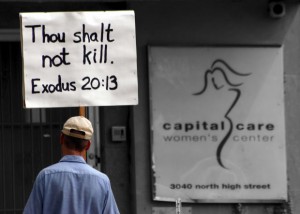 WASHINGTON — The U.S. Supreme Court largely appeared skeptical on Wednesday of a Massachusetts law that prohibits pro-life sidewalk counselors from coming within 35 feet of the entrance or driveway of an abortion facility.
WASHINGTON — The U.S. Supreme Court largely appeared skeptical on Wednesday of a Massachusetts law that prohibits pro-life sidewalk counselors from coming within 35 feet of the entrance or driveway of an abortion facility.
The nine justices of the nation’s highest court heard oral argument over the issue yesterday, listening to both sides as they presented their disputations both for and against the regulation.
As previously reported, the case before the court, McCullen v. Coakley, began in 2008 and was filed on behalf of seven pro-life residents—mostly Catholic—that regularly engage in sidewalk counseling outside of abortion facilities in Massachusetts. U.S. District Judge Joseph Tauro initially upheld the ordinance, stating that the requirement did not hinder free speech.
“From the evidence,” he wrote in his decision, “it is clear that the Act, as applied at each of the challenged [locations] leaves open ample adequate alternative means of communication.”
The First Circuit Court of Appeals agreed, finding no constitutional infringement inherent in the regulation.
“The nation is sharply divided about the morality of the practice [of abortion] and its place in a caring society,” it wrote. “But the right of the state to take reasonable steps to ensure the safe passage of persons wishing to enter health care facilities cannot seriously be questioned.”
The case was then appealed to the Supreme Court, which agreed to hear the challenge last June.
On Wednesday, the majority of the high court justices appeared unconvinced that the law was justifiable—specifically the size of the imposed buffer zone.
“I’m a little bit hung up on why you need so much space,” Obama nominee Elena Kagan told attorney Jennifer Grace Miller, who argued on behalf of the state. “You know, 35 feet is a ways. … That’s a lot of space.”
Justice Anthony Kennedy said that the state could find less restrictive means to further its interests of public safety, such as enforcing other laws that are already on the books.
“What’s wrong with the physical obstruction statutes as an answer to the problems Massachusetts is facing?” he asked.
However, Justice Antonin Scalia appeared to be the most understanding of pro-life sidewalk counseling, taking issue with Miller classifying those who wish to speak with abortion-minded mothers as “protesters.”
“I object to you calling these people protesters,” he said. “This is not a protest case. These people don’t want to protest abortion. They want to talk to women who are about to get abortions and try to talk them out of it.”
Scalia agreed that less restrictive means could be implemented other than the current buffer zone statute.
“Surely you could have a law against screaming and shouting within 35 feet or protesting within 35 feet. Isn’t that more narrowly tailored?” he asked. “What these people want to do is to speak quietly and in a friendly manner, not in a hostile manner, because that would frustrate their purpose, with the people going into the clinic.”
But Miller, during questioning, asserted that the buffer zone was reasonable and that there was no constitutional right “as a doctrinal matter, to close, quiet conversations.”
Justice Anthony Kennedy rebuffed Miller’s argument.
“Do you want me to write an opinion and say there’s no free speech right to quietly converse on an issue of public importance?” he asked.
While most of the nine justices questioned both sides about the regulation, Justices Clarence Thomas and John Roberts remained silent through the proceedings.
A written opinion is anticipated from the court in June, and could effect the rights of pro-life sidewalk counselors nationwide.
Become a Christian News Network Supporter...


